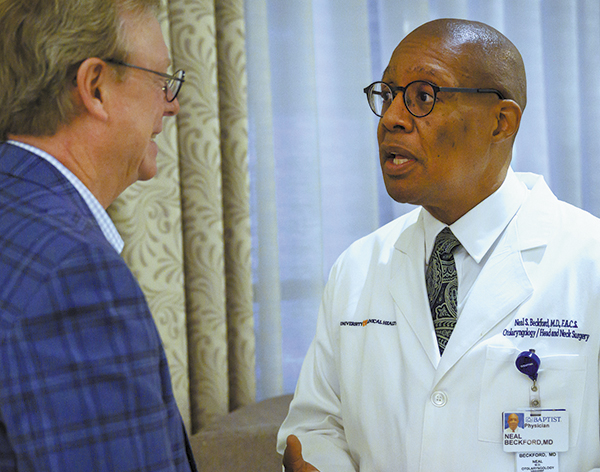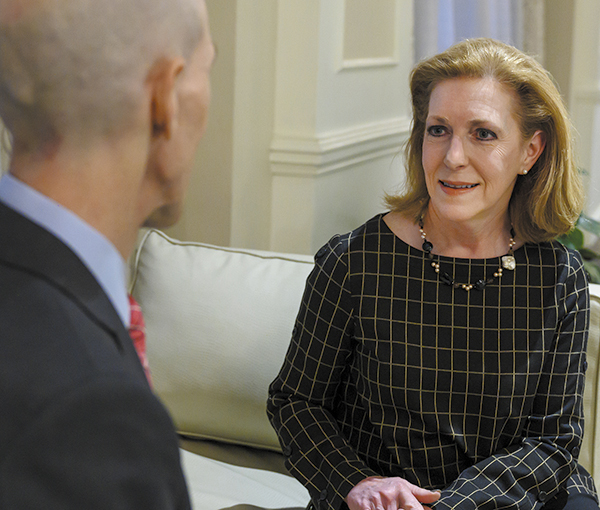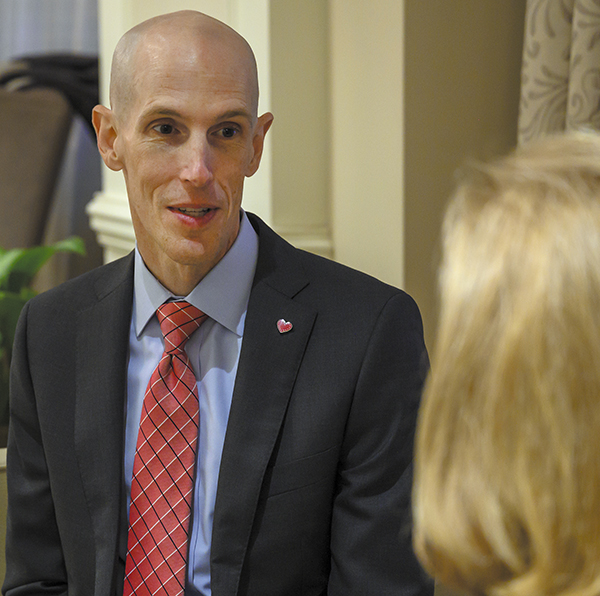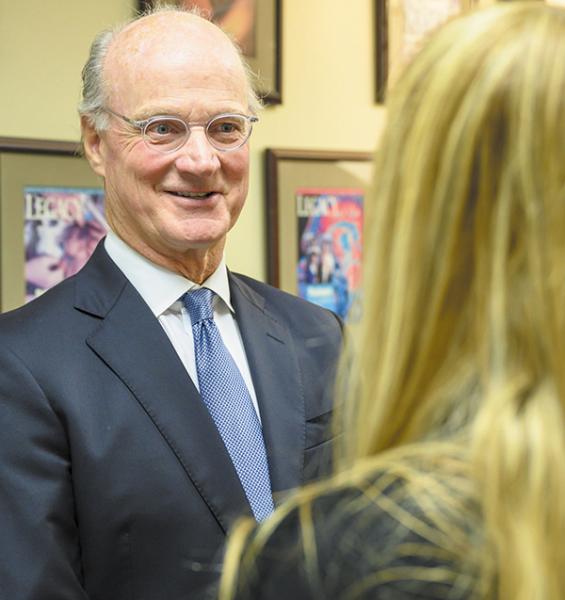Memphis Healthcare Leaders Reflect on Past, Present and Future
The last decade in healthcare has been one of the most important in U.S. history. It began with the passing and implementation of the Affordable Care Act on March 23, 2010. The passing of that law brought on controversy and much change. Certainly there are pros and cons.
For this issue of Memphis Medical News' InCharge, we asked our five cover honorees to reflect on the past decade and tell us how, in their view, healthcare has changed in general, in Memphis and in their respective organizations or professions. We also asked them to look into the approaching decade and tell us what they see.
Neal Beckford
Reflections:
"The changes in healthcare delivery that have occurred over the last decade are real and almost palpable. Efforts to decrease overall cost of healthcare are apparent in all facets of the healthcare delivery system and are driving much of that transition. All aspects of medical practice are being scrutinized, trying to identify what 'true quality' is and how to incorporate it into the medical mainstream. This is a work in progress, replete with fits and starts that hopefully will bring more competent, compassionate and cost effective healthcare to our community.
"Negotiating the changes associated with this transition will be difficult for all parties involved, healthcare providers, medical institutions and patients alike. Physicians have traditionally been the arbiters of healthcare decision making. Mid-level providers such as nurse practitioners and physician assistants, optometrists, AuD's, etc. are a growing presence in both primary care and specialty medical practices. They are competent healthcare providers, broadening their scopes of practice and expanding access to services by successfully assuming many roles traditionally held by physicians. Generally accepted by the community at large, these providers still strive to gain acceptance with certain populations who prefer a more traditional model where the physician wears the mantle of healthcare decision making.
"Educating the public as to the value of these providers will facilitate their thorough integration into our health care system with its attendant benefits. As solo and small group practices are replaced by hospital, academic and large single/ multispecialty group practices, traditional physician autonomy is decreasing. Ability to hire staff, determine compensation, design schedules and make capital purchases are often relegated to non-medical administrative personnel. Business algorithms and corporate compliance strategies that seem foreign to the practicing physician are used in making decisions.
"The physician may feel out of the loop, causing frustration, anger, and a sense of being fungible, as if he/she could be replaced at a moment's notice without remorse by employing entity. A true solution to the healthcare crisis will need to address the needs of all players involved, including patients, providers and the institutions that support them."
|
Title: Board Member, Tennessee State Board of Medical Examiners; Past President, Memphis Medical Society, Bluff City Medical Society Birthplace: Brooklyn, New York Experience: Clinical Associate Professor, Department of Otolaryngology/Head and Neck Surgery, January 1993- Present; Otolaryngologist, University Clinical Health, April, 2018 to Present |
Looking Ahead:
"The nexus of medical care will probably continue to move away from the traditional hospital model into the community for reasons of cost, efficiency and convenience. Pharmacy sponsored clinics, direct pharmacist treatment through physician compact agreements, company medical clinics and telemedicine are examples of disruptive influences that will impact the delivery of health care as we know it today. How the medical marketplace responds to these innovations is anyone's guess.
"Consolidation of provider networks, decreased reimbursement for services, and increasing administrative burdens will probably not abate for the seeable future. Critical shortages of nurses, surgical technicians and other ancillary personnel are compromising hospitals and like institutions ability to deliver the highest quality of care. Creative and affordable education programs that lead to substantial job opportunities in the industry are essential. Rising education debt is steering young physicians away from specialties that are underserved, and poorly compensated to those that will afford them the ability to better address their economic concerns. Creating a less financially burdensome path to medical education would alleviate the need to make some of those choices."
Carla Kirkland
Reflections:
"The consensus among the colleagues I polled was technology. Electronic Health Records, which nurses have a love/hate relationship with; telehealth; e-ICUs; robotic surgery; evolving newer and smarter machines which improve evaluation and treatment of the patient. Technology also provides data for metrics, which affect nurse staffing and healthcare reimbursement.
"The nursing shortage is ever-present and evolving in different ways, due to an increased demand for nursing jobs, need for nurses in certain specialties, a significant number of nurses nearing retirement age, and a shortage of faculty limiting nursing school enrollment.
"In the nursing profession, the number of nurses with bachelor's degrees has grown, and the number of nurses with a doctorate degree has tripled. Nurses are providing leadership on an ever growing number of health care, business, and community boards. Nurses are also moving into CEO positions at major hospitals and health systems.
"Schools of Nursing are working to improve diversity in their graduates. There is a long way to go but the number of minority and male RN graduates has increased, better mirroring the population in their care."
Looking Ahead:
"The nursing shortage is expected to continue into the next decade, making nursing a high demand profession, but also leading to increased job stress, burnout, and turnover in the nursing field. Nurse leaders will continue to excel as innovators, researchers, and educators.
"Tennessee has pockets of excellent health care, but too many of our patients' still lack insurance and in our largely rural state they are challenged to find local, quality, affordable health care. Tennessee ranks poorly in America's Health Rankings Report, most especially regarding lack of physical activity, obesity, substance use disorder, and nicotine dependence. We have higher rates of heart disease and diabetes. This necessitates an 'all hands on deck' approach. Tennessee has many outdated laws which restrict Advanced Practice Registered Nurses (APRNs), AND Registered Nurses, from practicing to the top of their education and training. Tennessee is also the only state in the U.S in which Nurse Practitioners are not allowed to prescribe buprenorphine, recognized as effective in the treatment of opioid addiction. Legislation needs to be updated to allow APRNs to practice and provide care more efficiently, and cost effectively, to combat the health crises in our state."
|
Title: President, Tennessee Nurses Association; Acute Care Nurse Practitioner, Saint Francis Hospital Emergency Department Birthplace: Bentonville, Arkansas Experience: RN, ICU, Central Arkansas General Hospital, Searcy, Arkansas; ICU, Saint Francis Hospital, Memphis; ACNP, Kraus Internal Medicine, Memphis |
Michael Wiggins
Reflections:
"The past decade has seen amazing advances in care for children. The capabilities of our physicians, nurses and other health professionals has come so far that children who might never have survived their illnesses a decade ago are now getting to go home. For example, today almost 90% of children born prematurely with extremely low birth weight (< 1.5Kg) will survive. That was certainly not the case a decade ago. The technology and knowledge that we have acquired in the last 10 years is truly amazing."
|
Title: President, Le Bonheur Children's Hospital Birthplace: Atlanta, Georgia Experience: President, Le Bonheur Children's Hospital, 2019; SVP, Operations, Children's Health System of Texas, 2018-2019; Administrator, SVP, Northern Market Executive, Children's Medical Center, Plano, Texas, 2015-2018, Vice President, Operations, Children's of Alabama |
Looking Ahead:
"Related to pediatrics, I believe transitions of care will become a more significant issue in the future. Because of continued medical advances, more children will survive into adulthood with pediatric illnesses; illnesses that adult physicians are unaccustomed to managing. Where will the medical home be for adults with childhood illnesses? What a wonderful issue to solve!
"I also have a hope for the future, that our nation will make larger investments in maintaining health. I hope that the economic incentives for health care providers will be more aligned with helping people maintain their health, rather than simply treating their illnesses."
Henry Sullivant
Reflections:
"For the practitioner, the influence of the electronic health record (EHR) and its challenge to the flow of patient care has been remarkable. The electronic record changed office practice efficiencies significantly. Only recently have practitioners been able to use the tool for effective communication with their panel of patients. But, as they become comfortable with its ability to quickly communicate results with patients and move information to and from care delivery sites, the costs of the electronic record begins to make operational sense. Patient movement within the office setting was at first disrupted by the EHR, but most patients find that the hassle of repetitive 'filling out forms' has been removed by the EHR. Clinicians find rewarding the doctor-patient relationship and do not like viewing the patient across a monitor. Ongoing is the challenge the electronic record puts on safety systems that healthcare has developed more than 100 years to minimize harm to patients. The electronic record serves as a defined augmentation to the time-proved failsafe systems, but the integration needs to be carefully governed.
"For a health care system, the electronic health record integration has been equally influential. For clinicians who provide inpatient care at the hospital as well as in their offices, health systems ask them to learn our system as well as theirs. This can be a barrier to our alignment to deliver care. Often, the practice system does not directly integrate with the hospital system, so efficiencies are not achieved. On the contrary, business office expenses remain steep for both the system and the practice.
"For health care in general, the explosion in the knowledge of the human genome is rapidly changing both the understanding of the physiology of disease, but also the opportunity to specifically tailor treatment to the individual. Historically, successful treatment has been challenged by the side effects of that same treatment. The more specific the treatment, the less the lateral effect...all permitted by the benefit of our understanding of the genetic composition of the individual and the disease.
"In addition, the vast majority of care can now be rendered as an outpatient. Joint replacement and many other surgical procedures are now exclusively accomplished without patients having to be admitted to the hospital.
"Other technological advancements have markedly improved patients' care and shortened their time to full recovery. As most care is rendered in the office or in other outpatient settings, fragmentation of care and its threat to collegial interaction among health care professionals is a concern. In the past, these professionals 'walked the halls' together. Now, most never come to the hospital. Most clinical updates can be captured from your smart phone. The need to attend conferences or share clinical experiences in the hospital dining room is gone. The risk is the loss of those relationships that have been equated with continuity of care."
|
Title: Vice President & Chief Medical Officer, Baptist Memorial 2017-Present Birthplace: Kosciusko, Mississippi Experience: Vice President & Chief Medical Officer, Baptist Memorial 2017-Present; Obstetrician/Gynecologist, Ruch Clinic, Memphis, 1989-2017 l Assistant Professor, Department of Gynecology & Obstetrics, UTHSC, 1989-2017 |
Looking Ahead:
"As health care becomes more portable and the interoperability of electronic records becomes seamless, then patients can have their care when they want it, and have it meet their needs to a successful outcome. Continuous monitoring of patient data as captured by mobile devices will facilitate actual knowledge of medication and treatment effects. Treatment adjustments can be made in real-time leading to better patient care . . . and not to have to sit in a waiting room waiting. Healthcare to our rural communities will improve as we expand our telemedicine capabilities avoiding the patients' need to drive an hour to their closest provider. Payment reform . . . what may on first glance seem disruptive, is actually going to be a significant relief to the entire provider community.
"In its formation, Medicare created payment siloes that inadvertently led to significant barriers to patients' movement about the system of care. For example, it limited the visits to your physician, required prior authorization for tests, restricted the criteria for admission to the hospital, and slowed the process of accessing nursing home or rehabilitation services after hospital discharge. Commercial insurance soon followed in its managed care programs. Advanced Payment Models are removing these restrictions to patient movement . . . the details go beyond this discussion, but the end result is that the patient, family, and provider will be the key decision makers, and not necessarily the payer of the services."
Mitch Graves
Reflections:
"As an industry, there have been many significant changes impacting access, technology, reimbursement, and quality. No doubt the ACA had a major impact to the healthcare landscape, providing affordable coverage and access to a population that previously could not afford healthcare. Also under the ACA, fully covered preventive screenings helped reduce health disparities in communities such as Memphis. Another is the passage of MACRA which has been the driver to value-based healthcare including bundled payments, ACOs, medical homes, and for oncology, Medicare's Oncology Care Model (OCM).
"Value-based has started to tie quality metric, outcome measures, and patient satisfaction to payments. Providers, especially hospitals, will need to shift from volume to value, focusing to keep patients healthy. The shift to EMRs over the last decade has allowed data collection to measure quality, utilization, and cost which was missing the first time managed care was rolled out.
"Oncology has probably seen the most changes impacting patient care than any other specialty. To start, improved molecular testing is changing how patients are treated. Molecular results provide an opportunity for an individualized approach to disease treatment. New treatments are now available such as immunotherapy which is a biologic therapy used to boost a patient's immune system to fight the cancer cells. One of the most exciting immunotherapies is Cart-T. In Cart-T, immune cells are removed from the patient and lab modified to better attack the cancer then put back in the patient."
|
Title: Chief Executive Officer, West Cancer Center Birthplace: Memphis, Tennessee Experience: Chief Executive Officer, West Cancer Center, May 2019 to Present; President & CEO, Healthchoice, LLC 2013-2019; President & CEO, Affiliated Services, Methodist Le Bonheur Healthcare |
Looking Ahead:
"Value-based healthcare is just getting started. As a country, we continue to see healthcare spend move closer to 20 percent of GDP and our outcomes are not improving. Employers, Medicare, and patients will continue to demand change that pays for results. The healthcare community is just now understanding how social determinants play into a population health so I expect more attention in the coming years.
"Technology will be a key factor in the coming decade. There are new cancer diagnosis tools under development such as liquid (blood) biopsies and breathalyzers which can identify presence of cancer cells. I expect other vaccinations such as the HPV vaccination to be developed in the future. Artificial Intelligence will have an impact on radiology, lab, and research in the next decade as data learning improves. Specialty drug cost will continue to be a topic of debate as the cost continues to grow at 10% a year.
"In 2021, Medicare is moving to a new oncology value-based model, Oncology Care First (OCF). Medicare's aim is to enhance success of its current Oncology Care Model with provider accountability for quality, outcomes and total cost of care. Having been part of Medicare's OCM, West is well positioned for success in OCF."



 Neal Beckford, MD
Neal Beckford, MD Carla Kirkland
Carla Kirkland Michael Wiggins
Michael Wiggins Henry Sullivant, MD
Henry Sullivant, MD Mitch Graves
Mitch Graves












